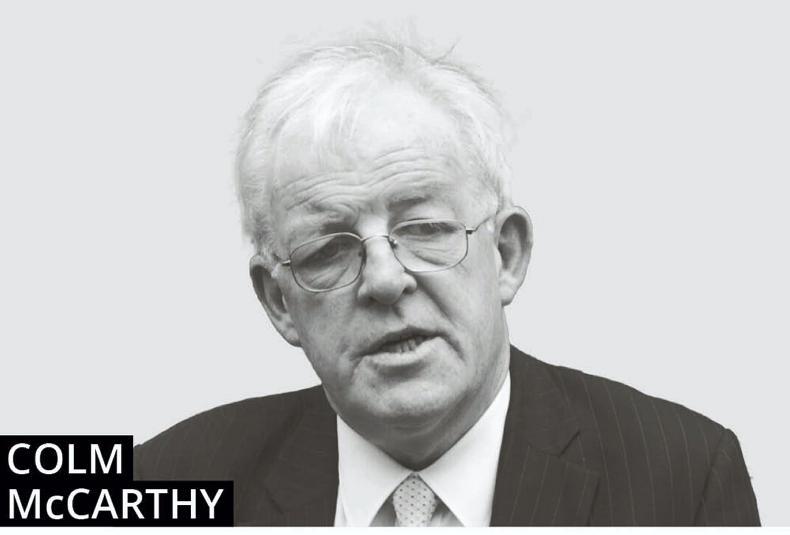The European summit in Brussels on 28 and 29 June will mark the commencement of the endgame on Brexit. The draft of the UK’s withdrawal (and transition) agreement will have to be agreed, signed, sealed and delivered by October’s summit to provide time for ratification before Brexit day, which is 29 March next year. The UK has tendered its resignation from the EU, customs union, single market and all, and automatically becomes a third country through the expiration of the two-year notice period just over 10 months from now. The transition period, which would see a standstill on current arrangements until the end of 2020, will only become effective if the withdrawal agreement is signed and ratified.
No agreement means a no-deal crash-out and chaos at the borders – not just at the Irish land border but at Dover, Calais, Rotterdam, Rosslare, Holyhead and all the rest and at the airports. At the current rate of progress in negotiations, there is little prospect of agreement in time. At the June meeting, the EU 27 face a simple choice: pretend that things are on schedule and waste more time, or break off the negotiations, forcing a political crisis in the UK and a change of course. An extended transition period could become the preferred can-kicking option.
Negotiation breakdown
A breakdown in negotiations was possible last December and again at the March summit, but the EU 27 chose to play extend-and-pretend since sufficient time was arguably still available for a clarification of the UK’s negotiating strategy. The illusion of adequate time is no longer sustainable: the choice for Brussels is to precipitate a crisis now or wait for it to happen anyway, with even less time remaining, in the autumn.
The core problem is that the UK government despatched its resignation letter at the end of March 2017, removing the two-year pin from the grenade, before it had a settled position on its Brexit strategy. The referendum outcome did not indicate a clear will of the people other than to quit the EU. There was no instruction from the voters about the single market, the Irish border, the customs union or any of the other soft v hard Brexit issues that have preoccupied Westminster ever since. It was a remarkable piece of insouciant wishful thinking by the UK government to trigger Article 50 in the Lisbon Treaty before these issues had been resolved.
Theresa May’s decision to go for an early election shortly afterwards made a difficult situation worse – she lost her majority and has been burdened with a divided party and cabinet ever since. The result has seen EU 27 officials desperately seeking clarity from their negotiating counterparts when there is none on offer. Last week her “war cabinet”, an unfortunate metaphor to say the least, was formally split into two working groups to consider alternative approaches to Britain’s long-term relationship with the customs union, both of which have been dismissed as unworkable by the Commission. Neither would solve the Irish border dilemma, which is mainly about the UK attitude to the single market and to agricultural trade. The UK cannot solve the Irish border problem through sole reliance on any customs formula.
Anyway, these are not issues for the withdrawal agreement but rather for the post-Brexit deal on the UK’s long-term trading arrangements with its European neighbours, which cannot be addressed until the UK becomes a third country at the end of March 2019. Listening to some Westminster politicians and reporters prattling on about customs unions and single markets in recent weeks, one could be forgiven for believing that the withdrawal agreement had all been wrapped up. Almost two years on from the referendum some media participants, including, some ministers, appear still to be confused about the detailed workings of various EU institutions and continually surprised as new difficulties, all of which should have been foreseen, are uncovered.
Citizens’ rights
The Irish border is moreover not the only unresolved issue with the withdrawal agreement. There are outstanding issues concerning citizens’ rights and the financial settlement. On the latter, the UK side appears to have accepted what looks to me like a poor deal on some aspects, for example the terms of the UK’s withdrawal from the European Investment Bank – they are getting a poor price for their shares. One wonders if sufficient attention has been devoted to the small print amidst the political manoeuvres of the divided Tory battalions.
If the EU 27 pull the plug at the end of June, the UK government will have to face choices which should have been made before Article 50 was triggered.
Indeed, they should have been clarified for the electorate’s consideration before the referendum, when 52% voted against continued EU membership. But not even the UK government knows what alternative they voted for.
Read more
Food miles fairy story
CAP budget hit by new priorities as well as Brexit
The European summit in Brussels on 28 and 29 June will mark the commencement of the endgame on Brexit. The draft of the UK’s withdrawal (and transition) agreement will have to be agreed, signed, sealed and delivered by October’s summit to provide time for ratification before Brexit day, which is 29 March next year. The UK has tendered its resignation from the EU, customs union, single market and all, and automatically becomes a third country through the expiration of the two-year notice period just over 10 months from now. The transition period, which would see a standstill on current arrangements until the end of 2020, will only become effective if the withdrawal agreement is signed and ratified.
No agreement means a no-deal crash-out and chaos at the borders – not just at the Irish land border but at Dover, Calais, Rotterdam, Rosslare, Holyhead and all the rest and at the airports. At the current rate of progress in negotiations, there is little prospect of agreement in time. At the June meeting, the EU 27 face a simple choice: pretend that things are on schedule and waste more time, or break off the negotiations, forcing a political crisis in the UK and a change of course. An extended transition period could become the preferred can-kicking option.
Negotiation breakdown
A breakdown in negotiations was possible last December and again at the March summit, but the EU 27 chose to play extend-and-pretend since sufficient time was arguably still available for a clarification of the UK’s negotiating strategy. The illusion of adequate time is no longer sustainable: the choice for Brussels is to precipitate a crisis now or wait for it to happen anyway, with even less time remaining, in the autumn.
The core problem is that the UK government despatched its resignation letter at the end of March 2017, removing the two-year pin from the grenade, before it had a settled position on its Brexit strategy. The referendum outcome did not indicate a clear will of the people other than to quit the EU. There was no instruction from the voters about the single market, the Irish border, the customs union or any of the other soft v hard Brexit issues that have preoccupied Westminster ever since. It was a remarkable piece of insouciant wishful thinking by the UK government to trigger Article 50 in the Lisbon Treaty before these issues had been resolved.
Theresa May’s decision to go for an early election shortly afterwards made a difficult situation worse – she lost her majority and has been burdened with a divided party and cabinet ever since. The result has seen EU 27 officials desperately seeking clarity from their negotiating counterparts when there is none on offer. Last week her “war cabinet”, an unfortunate metaphor to say the least, was formally split into two working groups to consider alternative approaches to Britain’s long-term relationship with the customs union, both of which have been dismissed as unworkable by the Commission. Neither would solve the Irish border dilemma, which is mainly about the UK attitude to the single market and to agricultural trade. The UK cannot solve the Irish border problem through sole reliance on any customs formula.
Anyway, these are not issues for the withdrawal agreement but rather for the post-Brexit deal on the UK’s long-term trading arrangements with its European neighbours, which cannot be addressed until the UK becomes a third country at the end of March 2019. Listening to some Westminster politicians and reporters prattling on about customs unions and single markets in recent weeks, one could be forgiven for believing that the withdrawal agreement had all been wrapped up. Almost two years on from the referendum some media participants, including, some ministers, appear still to be confused about the detailed workings of various EU institutions and continually surprised as new difficulties, all of which should have been foreseen, are uncovered.
Citizens’ rights
The Irish border is moreover not the only unresolved issue with the withdrawal agreement. There are outstanding issues concerning citizens’ rights and the financial settlement. On the latter, the UK side appears to have accepted what looks to me like a poor deal on some aspects, for example the terms of the UK’s withdrawal from the European Investment Bank – they are getting a poor price for their shares. One wonders if sufficient attention has been devoted to the small print amidst the political manoeuvres of the divided Tory battalions.
If the EU 27 pull the plug at the end of June, the UK government will have to face choices which should have been made before Article 50 was triggered.
Indeed, they should have been clarified for the electorate’s consideration before the referendum, when 52% voted against continued EU membership. But not even the UK government knows what alternative they voted for.
Read more
Food miles fairy story
CAP budget hit by new priorities as well as Brexit









SHARING OPTIONS